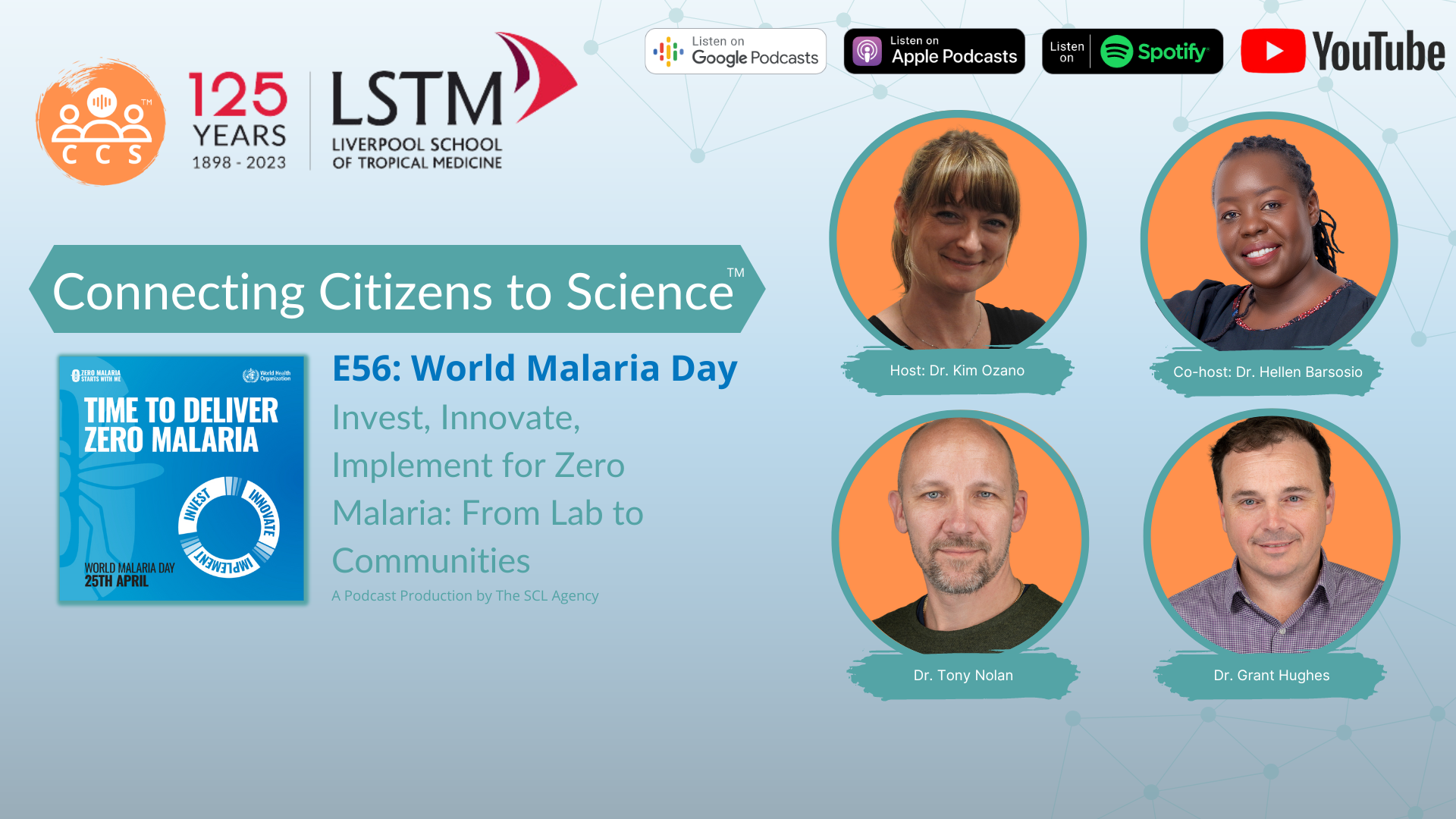
A podcast about connecting people and communities to research and science so that we can join forces to catalyse sustainable global change. In this episode, we are going to celebrate World Malaria Day with our co-host and guests. This year's theme is Time to Deliver Zero Malaria, and it is focused on investing, innovating, and implementing tools that are available today and innovating for future tools.
WHO calls to action include prioritising funding for the most marginalised and hard to reach populations who are less able to access services and are the hardest hit when it comes to becoming ill from malaria. To help us understand more, we have co-host, Dr. Hellen Barsosio, who is a medical Kenyan doctor who has been investigating risk factors, tools, and interventions to prevent adverse birth outcomes, and more recently research on preventing malaria in pregnancy. She is in her final year of her PhD at LSTM under the Department of Clinical Science, where her PhD focuses on new drugs to prevent malaria in pregnancy.
The WHO also calls for stepping up innovation for new vector control approaches, so we have two guests with us today to help us to understand what those are.
We will be speaking to reader and Wolfson Fellow, Dr. Grant Hughes, and reader, Dr. Tony Nolan from the Vector Biology and Tropical Disease Biology Department at the Liverpool School of Tropical Medicine. Tony has led the development of genetic tools to better understand the biology of mosquitoes that transmit malaria, and this has led to the development of genetic approaches to control mosquito populations. This is to decrease the amount of malaria transmission. Tony is also using some of these tools to understand how insecticides work, and in particular, how mosquitoes can evolve resistance to insecticides.
Grant is currently focusing on novel control strategies for arboviruses and malaria, and his overarching goal is to develop approaches which will either reduce mosquito numbers, or stop these mosquitoes transmitting the pathogens that make people ill.
This episode features:
Dr Hellen Barsosio - Clinical Research Scientist and section Head Maternal and New-born Health Studies, Malaria Program, KEMRI-CGHR
Over the past 11 years, Hellen has been investigating risk factors, tools and interventions to prevent adverse birth outcomes, and more recently research on preventing malaria in pregnancy as one of the causes of adverse birth outcomes in malaria endemic areas. She trained in Kenya as a medical doctor, and did her post-graduate studies at the London School of Hygiene and Tropical Medicine and University of Oxford. She is in the final year of her PhD at Liverpool School of Tropical Medicine under the department of Clinical Science where her PhD work focuses on new drugs to prevent malaria in pregnancy.
Dr Tony Nolan - Reader in Insect Genetics and Research Group Leader, Liverpool School of Tropical Medicine
Tony has led the development of genetic tools to better understand the biology of mosquitoes that transmit malaria. This has led to the development of genetic approaches to control mosquito populations, in order to decrease the amount of malaria transmission. Tony is also using some of these genetic tools to understand how insecticides work and, in particular, how mosquitoes can evolve resistance to insecticides.
Dr Grant Hughes - Reader and Royal Society Wolfson Fellow, Liverpool School of Tropical Medicine
Grant has been investigating the use of microbes to control mosquito-borne diseases for over 15 years. After undertaking a PhD at the University of Queensland in Australia looking at microbial control of crop pests, Grant moved to the US to complete a post-doctoral fellowship at Johns Hopkins Bloomberg School of Public Health to examine how a bacteria called Wolbachia infected mosquitoes and interacted with Plasmodium parasites, the parasites that cause Malaria. After further work at Penn State University, working on the same project, Grant moved to the University of Texas Medical Branch in Galveston where his research shifted focus to examine microbes, mosquitoes, and arboviruses. Since moving to the Liverpool School of Tropical Medicine research has focused on novel control strategies for arboviruses and malaria, with the overarching goal to develop approaches which will either reduce mosquito number or stop these mosquitoes transmitting the pathogens that make people sick.
Relevant links:
BBC article ‘UK scientists say they have reached a milestone in the fight against malaria by creating a genetically modified mosquito that is infertile’ https://www.bbc.co.uk/news/health-35024794